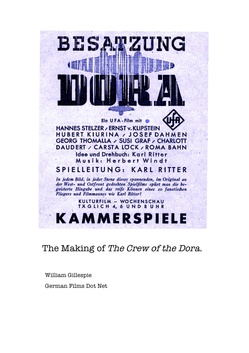Karl Ritter was the most famous, and probably the most prolific, of all the directors who worked in Germany during the Nazi era. Nowadays he is remembered mainly for creating medium of the Zeitfilm, the "contemporary movie," meant to reflect, in a cinematic way, the moment the ordinary German was experiencing; but the fact is he tended to shoot all of his military-themed movies in very much the same manner. They were sharply written, technically complex, featured fractured narratives, and tried to drive home the National Socialist virtues as he saw them: courage, loyalty, love, and sacrifice for the community. "The Crew of the Dora," a military romance shot in 1942, was his penultimate film and witnessed both the high-water mark and the beginning of the end of his career as a director. This book, by William Gillespie, documents Ritter's struggle to get the film made, and then, after its completion, the ultimately unsuccessful battle he waged to get it into theaters. In a sense it serves as something of a warning to all those artists who willingly serve totalitarian states: not only is your art at the mercy of the censor, so too is your career.
THE MAKING OF is a remarkable piece of original research by Mr. Gillespie. He managed to track down the estate of the now-deceased Ritter, who repaired to Argentina after WW2, and there located, organized and translated the extensive diaries and press-clippings the director had accumulated over his career. These diary entries are the basis of the book, which presents them in chronological order with a certain amount of narrative context. They follow Ritter, who was flushed with success after such movies as UBER ALLES IN DER WELT and STUKAS, as he writes the script for AIR CREW DORA, struggles to get it approved by the Reich Chamber of Film, deals with casting issues (many of his actors were drafted during the production or recalled to military duty, and he had to secure exemptions for them), budget constraints, technical problems, and the nightmare of shooting a movie on location in occupied France, Fascist Italy, and the very active Russian Front. Indeed, the best passages in the book detail the long train ride the cast and crew took through the occupied Soviet hinterlands on the Leningrad front, and how many of them had to stand watch with submachine guns as the train plodded through partisan-infested territory! What fascinated me most about it, however, was the way I could relate to Ritter's woes and anxieties as he pushed and prodded the trouble-plagued production to its conclusion. I've lived and worked in Hollywood for a dozen years now, and I well know the difficulties of shooting a movie. Turns out they haven't changed between 1942 and 2018. Ritter worried about the weather, he worried about the light, he worried about the budget and the shooting schedule and the script, and he worried (and complained, at some length) about his actors. George Lucas once remarked that film-making is war, and in Ritter's case it was more or less literally true! [this review continues with another three long paragraphs –please go to the Amazon page to continue reading!]
High Praise for our
book, The Making of the
Crew of the Dora !
As copies of the The Making of the Crew of the Dora book have circulated, we have received the following remarks from very well known and respected German film historians and authors of books on NS cinema and/or NS propaganda; as well as the review quoted from the prestigious Historical Journal of Film, Radio & Television and from CineGraph's issue #60 Filmblatt.
Sadly, the enthusiastic comments and praise for the book from noted scholars and professors emeritus must remain anonymous, which was requested, due to the opprobrium associated with NS film, even from respected authors of standing. That is the sad state of "Politically Correct" affairs at leading universities across the USA, UK, and Europe.... (We have also been told that many Masters' Thesis and PhD Thesis subjects in Germany on National Socialist topics are rejected instantly by leading German universities if they broach "taboo" subjects not in favour by the academic Nomenklatura. )
“ [The Making of the Crew of the Dora] provides a vivid and convincing account not only of the atmosphere, day-to-day routines, and problems associated with filmmaking (esp. location work) close to the fronts of WW2, but also of the anxieties and difficulties associated with getting the project approved in the first place. Your well-chosen, sparingly inserted explanatory notes and images really bring the “making of” to life. The way in which you have identified the people (from the world of film as well as the military establishment) associated with Ritter is a genuine proof of your commitment to the project, as is your deciphering and transfer of the Sütterlin-German into readable English – a genuine achievement!!! Congratulations!!! The book presents a convincing and genuine portrait of Karl Ritter the man. Really a book you can be proud of. “ --- A film historian and scholar, living in Europe, who has published books on NS film over the years, who wishes to remain anonymous.
“Dear William Gillespie,
Heartiest congratulations on the publication of BESATZUNG DORA. This is quite an achievement and how commendable that you have access to Karl Ritter’s diary and the family photo collection. A real contribution to history. I could not put the book down and enjoyed reading it immensely.....
Sadly, I am asking you to keep my remarks private. It is no fun being called a 'fascist.' I know that you will understand. I wish you great success with the book.” --- A retired Professor Emeritus in the USA, who has written extensively on NS propaganda and ideology, who wishes to remain anonymous.
"The Making of The Crew of the Dora does not fundamentally change our view of how films were made in Nazi Germany. It does, however, provide an unprecedented behind-the-scenes account of how one film was made, on a day-to-day basis. The development of the script (which had to be authorised by the Armed Forces High Command), the selection of the actors/actresses, the film people Karl Ritter met and the other films he viewed or was involved in (as a producer).... The book is filled with details of great interest to any student of ‘Third Reich’ cinema. Ritter’s description of his living and working conditions in military camps in occupied France and in the Soviet Union are also relevant for historians not particularly interested in cinema history." –The Historical Journal of Film, Radio & Television, September 2016. (Review by Prof. Roel vande Winkel.)
" Let me again express my admiration for your work on Ritter, a work almost you alone could do, since you knew eg the alphabet and so on. Although it's not a PhD in the academics, it's of a much higher level than PhD's in film of which I am or promoter or jury member!!! " – written on 1 October 2016 by the late lamented Luc Deneulin, Belgian film historian and Leni Riefenstahl expert, who worked tirelessly on the IOC's newly restored version of her Olympia.
Dear William Gillespie,
I've never expected that a book would be written devoted solely to that technically very interesting Karl Ritter movie, "Besatzung Dora", and that it would be written not in German but English language. Can't wait to read the full manuscript.
It looks like the definitive book on that topic and maybe on its director. --- A German film historian who has published extensively on NS cinema, who wishes to remain anonymous.
" With his 2012 published biography Karl Ritter. His Life and 'Zeitfilms' under National Socialism (2nd edition: 2014), Gillespie presented a standard work on one of the most systematic filmmakers of the Nazi era. In these diaries, The Making of The Crew of the Dora is also based on the following: Gillespie portrays his production on the basis of Ritter's diaries and, at the same time, presents the upcoming press campaign for the film's application. As a German reader, one is confronted with mixed feelings about the result, which is similar in large parts to a collection of sources: on the one hand, one must recognize the author's merit in making the otherwise inaccessible primary sources available; On the other hand, it is inevitably regrettable to find it abbreviated and translated into English. For the time being, it is only to be hoped that Gillespie will make use of his contact with Ritters' grandson, in order to stimulate a complete adaptation of this source, which is not only important from a film history point of view. [....] With the debacle of [the film] BESATZUNG DORA, Ritters' ability to stage other timely scripts, which he was almost fanatically determined to do, also disappeared. In addition to the list of unrealized projects presented by Gillespie in his Ritter monograph (2nd edition, pp. 139-142), it would have been very interesting to know whether Ritter drew recognizable lessons from the experience of BESATZUNG DORA and to what extent his later well-known war film projects were realized. These notes are also intended as suggestions for further Karl Ritter research, for which The Making of The Crew of the Dora as a documentary collection will represent an indispensable reference. " --Filmblatt, 21. Jg., Nr. 60, Herbst 2016, CineGraph, Hamburg (Review by Dirk Alt.)
And, last but not least, from a unknown buyers of the book on Amazon.com:






